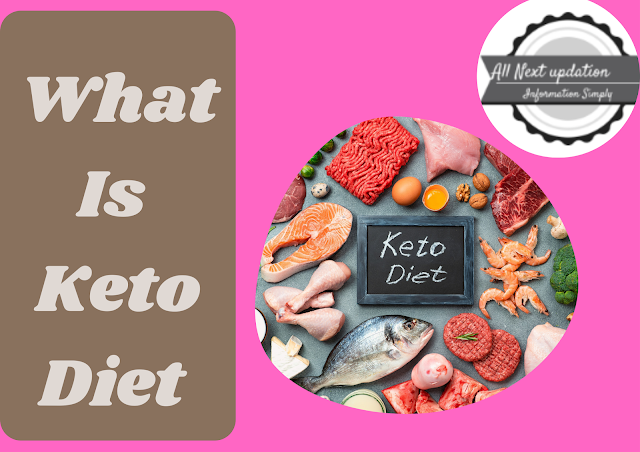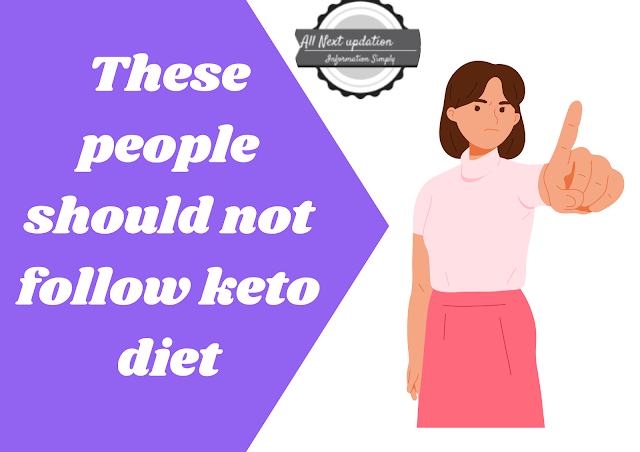The "Ketogenic Diet", sometimes referred to as the "keto diet", is a modern weight loss method used throughout much of the world. It helps you lose as much weight as possible in 10 days and is incredibly effective at burning body fat. Keto diet, according to keto diet experts, leads to rapid weight loss as well as increased energy.
What Is Keto Diet
The short form of keto diet is when the body uses ketones as a source of energy. When following this diet, you avoid carbohydrates and consume a lot of fat. While following this diet, eat cheese, certain vegetables and keto drinks; Avoid fruits. And you can use chicken, mutton, fish and smoothies with coconut oil as a source of protein.
Benefits Of Keto Diet For Our Health
By following the keto diet,
you can get the following benefits for our health. such as :
• Weight loss, as
the amount of body fat begins to drop significantly
• Diabetes relief, as blood sugar levels
begin to drop
• Healthy Heart
• Epilepsy relief
• Improve Alzheimer's
• Improvement in Parkinson's disease
• Improve PCOS
• Help to recover from brain injury etc.
· Cholesterol: The keto diet improves
triglyceride levels and can also improve cholesterol levels.
cholesterol deficiency and type-2 diabetes over time.
What to eat in Keto Diet
You must pay close attention to your diet while following the keto diet plan because eating the wrong things in between meals can make you go out of ketosis. In this diet, you should consume foods that are high in fat, low in carbohydrates and moderate in protein. For example, cheese, cream, butter, walnuts, coconut oil, almonds, cashews, peanuts, olive oil, chicken, mutton, green vegetables, nuts, seeds, etc. can be taken.
What not to eat in Keto Diet
The keto diet's list of prohibited foods is more extensive than the list of allowed foods. You are not allowed to eat any foods such as potatoes, bread, pulses, chickpeas, wheat, sugar, yogurt, milk, or fruits (including apples, bananas, pineapples, oranges, limes, and grapes). Because they contain a lot of carbohydrates.
Types of Keto Diet
Standard ketogenic diet - When a person is on a standard ketogenic diet, they have to consume 70% fat. 20% protein and 10% carbs.
Targeted ketogenic diet - When a person is on a targeted ketogenic diet, they can consume a lot of carbs after doing a lot of workouts.
High Protein Ketogenic Diet - When a person is on a high ketogenic diet, he has to consume 60% fat, 35% protein and 5% carbs.
Slackel Ketogenic Diet - When a person is on the Slackel Ketogenic Diet, he/she is advised to eat low carb for 5 days and high carb for 2 days in a week.
These People Should Not Follow Keto Diet
Even though the Keto Diet Plan helps people lose weight, some people need to talk to a doctor before starting it. Bear in mind practicing the keto diet can be harmful.
Losing weight has become a fashion. People adopt various weight loss techniques which sometimes result in harm to their body. Experts claim that if you do not lose weight effectively, your body is deficient in certain nutrients. Weakness, dizziness, nausea and vomiting are experienced in this scenario. People now regularly follow the Keto Diet to lose weight. High fat, low carb diets are the basis of the current keto trend. Experts claim that it contains about 75% fat, 20 grams of protein and a set amount of 5 grams of carbohydrates. Because there are very few carbohydrates in the body, only fat is used for energy production.
Health professionals claim that when you increase your fat intake on this diet, ketones begin to accumulate and work to convert your fat into energy. Even though this diet is helpful for weight loss, some people should talk to a doctor before starting it. Learn who should not follow the keto diet plan.
Diabetes – Insulin is recommended to manage blood sugar levels in diabetic patients whose levels have increased. People who use insulin should not follow the keto diet. Diabetes patients should consume less carbohydrates, but a balanced diet is also necessary for the body. These people may have many types of health problems.
Children below the age of 18 years - Children are encouraged to eat a diet rich in carbohydrates, proteins and other nutrients because they are at that stage of life when their bodies are developing rapidly. Low-carb diets such as the ketogenic diet can inhibit their growth. A child should not follow a low-carb diet, even if he or she is overweight. To maintain the weight, however, a low-calorie diet can be followed.
Pregnant women – If you are pregnant or nursing a baby, don't follow the keto diet even by mistake. The growth of the child can also be affected by such a diet which is considered best for weight loss. In this way your weight will also reduce.
Post Surgery- People who have undergone any kind of surgery should not consume ketones. After any surgery, the body needs to recover quickly. In such a situation, if there is a deficiency of calories, vitamins, minerals, proteins and lipids in the body, then the problem can become even more serious.
How Does The Keto Diet Work
Carbohydrates are in every food you consume. When one eats carbs, the body converts them into sugar, which is helpful in producing energy. When the body is in ketosis and carbohydrate intake is reduced, the body begins to use fat for energy. The result is a decrease in glucose levels. As the body's glucose level drops, the body is forced to make ketones, which are then found in the blood and urine as acids, a sign of fat burning. This is the ketosis state.
Conclusion - Allnextupdation has told you in this article what is keto diet? and what are its benefits? How can we lose weight with keto diet? If you have any misunderstanding in the given article, please let us know through comments.
Disclaimer: The method, methodology and claims discussed in this article are not endorsed by Allnextupdation. Please consider them as advice only. Be sure to consult a doctor before starting any such treatment, medication or diet.





